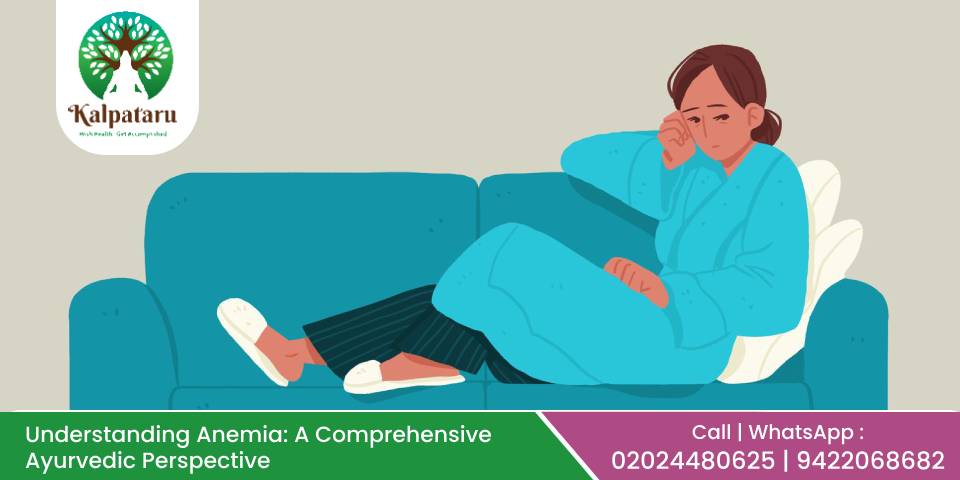Anemia, a condition characterized by a deficiency in red blood cells or hemoglobin in the blood, often leads to fatigue, weakness, and a decreased ability to carry oxygen to the body’s tissues. While modern medicine provides various treatments, Ayurveda, the ancient Indian system of holistic healing, offers insightful perspectives and natural remedies to address anemia.
Understanding Anemia in Ayurveda:
Ayurveda views anemia as a result of imbalances in the body’s three vital energies or doshas: Vata, Pitta, and Kapha. According to this ancient science, anemia primarily stems from imbalances in Pitta and can be influenced by poor digestion, weak agni (digestive fire), and improper diet.
Causes according to Ayurveda:
- Agnimandhya (Weak Digestion): Poor digestion leads to inadequate absorption and assimilation of nutrients, including iron, causing anemia.
- Vitiation of Pitta Dosha: Pitta imbalance can cause an excessive heat that affects blood quality, leading to reduced hemoglobin levels.
- Dietary Factors: Inadequate intake of iron-rich foods, improper food combinations, and consumption of foods that aggravate Pitta can contribute to anemia.
- B12 in Diet: Vitamin B12 plays a crucial role in red blood cell production. Its deficiency can contribute to anemia as it is essential for the synthesis of hemoglobin.
- Worms in Children: Additional cause of anemia, especially in children, can be attributed to intestinal parasites or worms. These parasites can disrupt nutrient absorption, leading to deficiencies, including iron, contributing to anemia.
Common symptoms of anemia include:
- Fatigue and Weakness: Persistent tiredness and a lack of energy are common signs of anemia due to decreased oxygen-carrying capacity in the blood.
- Hair Fall: Anemia can lead to hair loss or thinning as the body prioritizes vital functions over non-essential ones like hair growth due to inadequate oxygen supply.
- Pale or Yellowish Skin: Reduced hemoglobin levels can result in paleness or a yellowish hue to the skin due to diminished oxygenation.
- Shortness of Breath: Insufficient oxygen reaching body tissues may cause difficulty in breathing or shortness of breath, especially during physical exertion.
- Dizziness or Lightheadedness: Anemic individuals may experience dizziness or lightheadedness, often due to decreased oxygen supply to the brain.
- Irregular Heartbeat: Anemia can lead to irregularities in heart rate or rhythm as the heart works harder to compensate for reduced oxygen levels in the blood.
- Headaches: Inadequate oxygen supply to the brain may cause headaches, which can range from mild to severe in intensity.
- Loss of Appetite: Anemia can cause a decrease in appetite due to overall weakness and reduced energy levels.
For more information and treatment modalities watch our informative video
Ayurvedic Approaches to Manage Anemia:
Diet and Lifestyle Modifications:
- Balanced Diet: Emphasize foods rich in iron and nutrients, including leafy greens, beets, dates, figs, and soaked raisins.
- B12-Rich Foods: Include meat, fish, dairy, and fortified cereals for sufficient vitamin B12 intake.
- Pitta-Pacifying Diet: Consume Black resins, kharjur, clarified butter, figs, ragi to balance Pitta.
- Herbal Support: Incorporate herbs like Punarnava, Amalaki, and Guduchi known for their rejuvenating and blood-building properties.
- Proper Food Combining: Follow Ayurvedic principles of food combining to enhance digestion and nutrient absorption.
- Regular Exercise: Engage in moderate exercises like yoga, walking, or swimming to improve circulation and vitality.
Ayurvedic Therapies and Remedies:
- Panchakarma: Detoxification therapies like Panchakarma can help balance doshas and improve overall health.
- Ayurvedic Formulations: Use herbal formulations like Navayasa Lauha, Lohasava, tapyadi loh, mandur to boost hemoglobin levels.
- Rasayana Therapy: Adopt rejuvenating therapies to enhance overall strength and immunity.
Importance of Liver Treatment in Anemia:
The liver plays a significant role in blood production and overall health. Ayurvedic treatments focusing on liver health can enhance hemoglobin levels. Herbs like Kutki and Bhringraj support liver function, aiding in the synthesis of blood components and ultimately increasing hemoglobin levels.
Maintaining Hemoglobin Levels:
For sustaining hemoglobin levels, consistent treatment and lifestyle modifications are essential. Ayurvedic practitioners often recommend a 3-6 month medication regimen, along with dietary and lifestyle changes, to ensure a gradual and sustainable improvement in hemoglobin levels.
Conclusion:
Anemia, as viewed through the lens of Ayurveda, is a condition rooted in imbalances within the body. By addressing digestive health, balancing Pitta dosha, and incorporating specific dietary habits, herbal remedies, and lifestyle changes, Ayurveda provides holistic methods to manage anemia naturally.
It’s crucial to consult an experienced Ayurvedic practitioner for personalized guidance and to determine the most suitable approach based on an individual’s constitution and specific imbalances.
By embracing Ayurvedic principles and practices, individuals experiencing anemia can foster balance within their bodies, supporting overall health and well-being.
Dr. Manoj Deshpande and Dr. Aparna Deshpande at Kalpataru Ayurvediya Chikitsalaya™ Clinic provide the best Ayurvedic Treatment for Psoriasis & various diseases in Pune, Maharashtra. For more information about our comprehensive treatment options, or to request an appointment with the best Ayurvedic Doctor in Pune, call +919422068682 / +919764837167 / 020-24480625 or Click on Book an Appointment.

